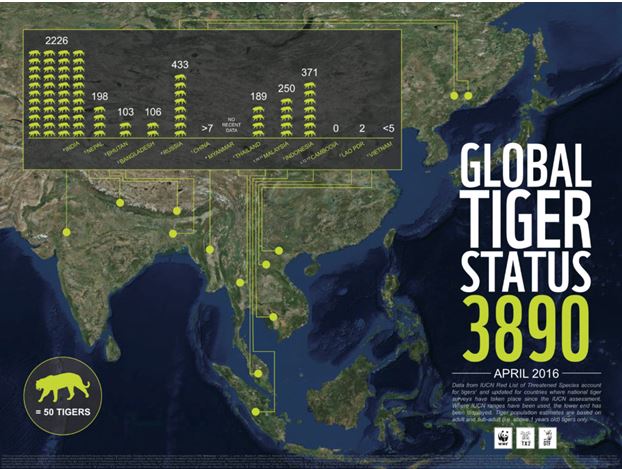Doubling Wild Tigers with Asian Tigers Group

The wild tiger is one of the most symbolic creatures in terms of majesty and strength. Even at that, it had a pretty precarious future. The wild tiger population has dropped by over 95 percent in Asian countries in the past century. Presently, these majestic creatures are teetering at the brink of extinction due to large-scale habitat loss, poaching, and human-wildlife conflict. In response to this emergency, the Asian Tigers Group has been working in association with WWF-Singapore in securing a future for wild tigers of Asia. Together, they work to roll out an interesting and visionary objective called TX2–to double the worldwide interest of the wild tigers by 2022, the next Chinese Year of the Tiger.
The Asian Tigers Group, international relocation solutions provider, has pledged its resources and far-reaching network to assist with this critical conservation endeavor. Together, the Asian Tigers Group and WWF-Singapore will raise awareness and mobilize action to reverse the decline of wild tigers. Through this cooperation, the firm strongly reflects its corporate social responsibility policy and commitment toward the preservation of biodiversity.
Wild tigers are the apex predators; hence, they play vital roles in maintaining the health of an ecosystem. Their presence will stabilize populations of prey species and allow other species to remain balanced under their home territories. However, their severe decline has entailed broad ecological repercussions. Their loss will tip the balance in nature, leading to overpopulation by some species and degrading the environment.
WWF-Singapore’s TX2 initiative is a holistic approach undertaken to the hearts of wild tigers, spanning anti-poaching efforts, habitat restoration, and community engagement. The approach involves conserving the tigers in protected areas and wildlife corridors that would allow them to roam freely and breed safely. Added to this would be collaborating with local communities on sustainable livelihoods and the reduction of human-wildlife conflict.

The Asian Tigers Group has pitched in both financial and time commitments towards TX2 participation. It is actively pursuing far-reaching awareness campaigns, participating in fundraising events, working through the influence of its huge clientele and industry connections to spread the message on tiger conservation. This includes various events, educational material, and liaising with the media on communication for wild tigers.
Advanced technology is one of the major components in the TX2 initiative, focusing on monitoring tiger populations and combating poaching. WWF-Singapore takes advantage of advanced tools in camera traps, drones, and GPS collars while tracking tigers, which provides the organization with critical data on movements and behaviors. This information is very critical in tailoring credible conservation strategies for the safety of endangered animals. It is in this aspect that support from the Asian Tigers Group in funding these technologies makes a difference in the area of enhancing capabilities on the ground for the conservationists.
The Asian Tigers Group-WWF-Singapore grouping also lends an international dimension to this conservation of wildlife. Wild tigers can never be only an Asian concern; it is taken up as responsibility for the world at large. The TX2 calls for collaboration between its governments, NGOs, businesses, and individuals to unite in fighting against the threats to the tiger. With a world view and approach, the Asian Tigers Group fits the bill as an important partner in this global initiative.
In other words, the partnership of the Asian Tigers Group and WWF-Singapore is one giant step to secure a wild future for tigers. Doubling the present population of tigers, with a view to achieving the TX2 goal by 2022, they aim further—to show an even greater commitment to conservation. Such commitment enables the Asian Tigers Group to live out its two core values of responsibility and stewardship. The partnership brings much hope for the survival of one of the world’s most iconic and endangered species as we head into the next Chinese Year of the Tiger.






